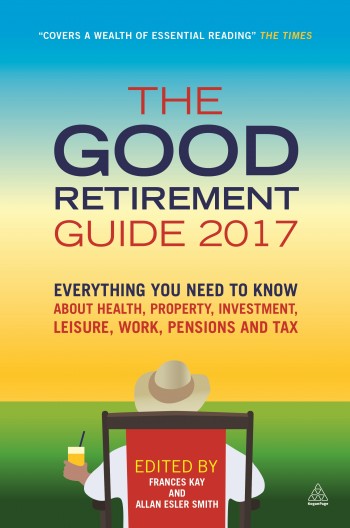
Over 15 per cent of people now work for small businesses. More and more people are setting up their own company and becoming their own boss. Whether it is earning £2000 to supplement a pension, or building a business that can keep you occupied for years to come, retirement can be the time to seize opportunities.
The Good Retirement Guide 2017 (Kogan Page), by Allan Esler Smith and Frances Kay, looks into the key areas to consider when starting your own business, and provides marketing tips to ensure your new venture is helping you to make the most out of your retirement.
Marketing and selling will be massively important to the success of your business, and it is a sad fact that many new business owners believe that marketing simply means placing an advert in some well-known directory. This will achieve only a fraction of the sales of any comparable business with a decent grasp of marketing. So how can you generate sales for a new business? The following tips should start to help you along:
1. Your own website and/or social media. Business and the public rely heavily on the internet and a presence is vital either through a website and/or harnessing social media. Is there a vital domain name (website unique address) that you need to secure and register? If this one question alone fills you with fear the solutions are nearer than you think – just try asking friends and don’t ignore help that is right in front of your nose: young friends or relatives may know more than you.
It is also worth checking out websites run by trade or professional associations that may allow you to register and set up a profile. You can set up profiles on various social media ‘networking websites’ such as LinkedIn. Depending on your business, Facebook and Twitter can provide the benefits of building your online contacts and allow you to showcase your expertise in a certain area. Social media (very like networking, below) is not about sell, sell, sell. It is more about building relationships and trust with an ever-increasing contact list.
2. Personal contacts and networking. Once you decide to set up your own business, your personal contacts, ex-colleagues or other small business owners are a potential source of work. Too many small businesses forget that behind every contact there is another layer of potential contacts, who are just one introduction away; so ignore this multiplier effect at your peril. In your first year you should be re-educating your contacts to think of you not as ‘Jane who used to work at IBM’ but ‘Jane who now runs her own business advising small businesses on their IT needs’. Do not be afraid to pick up the phone or send business cards explaining your new business and what you can offer. Joining the best trade or professional association you can find will be a great way of networking, with the added bonus of research facilities, information and other fringe benefits.
3. Discounts and offers. These can be used to great effect during seasonal dips, introducing a new service or clearing old stock. Whether it is 20 per cent off, a buy-one-get-one-free offer or the numerous variations of this basic approach, there are three golden rules:
Always state the original or usual price (to show the value in the offer).
Always specify an expiry date.
Always explain that the offer is subject to availability.
4. Flyers and business cards. Generally speaking, a response rate of 1 per cent to a flyer is considered fairly good. With some clever thinking you can increase the response rate. Have you targeted the flyer? A good example would be a wedding gown designer who neatly persuades a sought-after wedding location hotel to keep a flyer dispenser in their foyer. Are you able to include your professional or trade association logo on your flyer and business cards? Have you asked if this is possible? There are two sides to a flyer and business card – have you thought about putting information on the blank reverse side? Could this contain some useful tips or, perhaps, a special offer or discount? Anything that ensures the card or flyer is kept rather than dumped will help your business to edge ahead.
5. Testimonials. People generally buy on trust, and testimonials show prospective customers that you have done a good job and can be relied upon. Positive testimonials can be powerful and should never be underestimated.
6. Agencies. Agencies will be especially important for prospective consultants or contractors, as many recruitment agencies also place full- and part-time contracts (as opposed to employed positions). The contract market is growing and offers dynamic and fast-moving industries the opportunity to hire (and fire) swiftly. When marketing yourself through an agency the same rules apply as when marketing yourself to a potential employer. Good personal and written presentation will help the agency to sell you on to its clients – and it is in their interest to find you work, given the fee they receive for placing you.
7. Advertising. There are many options for advertising yourself and your business, such as website banners, free and paid-for directory listings. Another approach could be ‘free’ advertising through a press release that you forward to local or trade press with an interesting story. A clever variant is advertising yourself and your skills by writing articles in professional or trade journals – what do you have that is news or novel or leading edge?
8. Sponsorship. Another subset of advertising is sponsorship. The driving instructor who sponsored the playing shirts on the local under-17s football team is a great example of cost-effective and rather clever sponsorship.
9. Awards. Business awards can offer new businesses an opportunity to make a splash in the local area, introduce you to other vibrant businesses, and there may even be a category for mature business owners newly starting up. These are often sponsored by local press and the Federation of Small Businesses (fsb.org.uk), where more information can be found.

Allan Esler Smith is a Fellow of the Institute of Chartered Accountants and specializes in helping people start up in business, accounts and tax. He is also an author, and has held a number of senior roles in City regulation investigations.
To receive 20% off a copy of The Good Retirement Guide 2017, please use the discount code PGRG20 at www.koganpage.com/GRG2017
Find a Home-Based Business to Start-Up >>> Hundreds of Business Listings.
















































